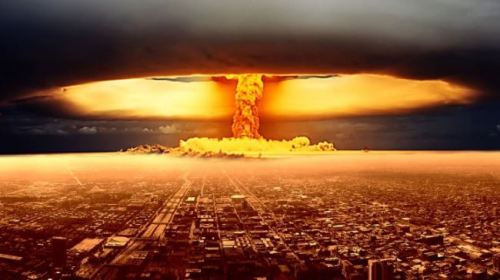Every year, at least one intercontinental ballistic missile is launched thousands of miles from a United States submarine to an instrumented area in the ocean. The purpose of this is to test the reliability of the complete system, including the accuracy of its independently-targeted dummy warheads. Also tested at these times is the integrity of the chain of command authorizing the launch.
Does the crew know they are launching a pre-planned dummy weapon? I hope and expect that the sub’s captain would know, but I’m not actually sure. It probably doesn’t matter much. This is what they train for. The missile(s) will be launched within mere minutes. I’ve been retired too long from the submarine Navy to be up on such policies, and it would be classified anyway. After all, the deterrence of the system depends on instant and unquestioning obedience to the orders of a single person, the president of the United States.

The Constitution requires that a declaration of war be the decision of Congress, a power and responsibility that have not been exercised since the invention of nuclear weapons. That’s partly because the orbital flight of such missiles requires only half an hour and even with specialized satellite sensors, there is no time for speculation or debate, nor politics of any kind. The policy, half a century old now, is called MAD, short for Mutually Assured Destruction. (The other reason a declaration of war is no longer required is technology – no draft call-ups or civilian sacrifice needed.)
An all-out nuclear war would probably end the human species. Not only would we die from blast and radiation, but also from catastrophic effects on the environment. Crops and livestock would die. The ozone layer would be severely damaged, eliminating the radiation protection essential to life. Some say there would be a “nuclear winter.” But with warhead sizes tens and hundreds of times those of WW II, even limited blasts over populated areas would have severe effects because of fallout.
With these thoughts in mind, and feeling a little insecure about politics lately, I searched and found a fascinating story from 6 years ago, a remarkable story about an Air Force officer who had a simple question about nukes and what happened to him. It seems even more relevant to me now than it would have been in 2011. What do you think?
And, by the way, just what does it mean when they say, tactical nuclear weapons?





Jim: This is scary stuff. And to know that Trump has this power at his fingertips is terrifying! Bud
LikeLike
It is just a matter of time, Bud, before the Orange Menace discovers that orders to the military are the only ones that get immediate results.
LikeLike
Scary as hell. This is one reason I’ve been so deeply concerned about Trump getting elected. I think giving him the nuclear codes borders on insanity.
LikeLike
Just electing this narcissist borders on insanity, but here we are.
LikeLike
It seems to me that the continued existence of the human species as well as most other
animals and life on this planet has been placed into the hands of a profoundly ignorant man who has the temperament of a pre-schooler. How can it be that this would-be strong-man has approval of 40% of Americans, and there is no serious talk of impeachment over the several
ways in which he is already in violation of constitution? How can this be! But — one Q: it has been my understanding that it takes two people to push the World War III button – that one
person alone cannot set it off. No?
LikeLike
Helen, our fate is in the tiny hands of a single disturbed and unpredictable man. According to a column from Brookings last March, nobody has yet figured out how compose a sane nuclear-launch policy different from that of the Cold War. Nobody wants to touch it, but if ever there were a time, now is it. The author proposes a solution, which needs to be discussed and debated.
LikeLike
Thanks, Jim, for sharing this and the link to the article about Maj. Hering. The potential for tragedy is higher than ever with our current commander in chief. I can only hope my own son will have the courage to refuse unlawful orders of any kind. I think he will …
LikeLiked by 1 person
It is significant, Melanie, that a military officer’s oath of office, unlike the enlisted, is to the constitution and not to superiors. This nuance is insignificant in normal times, which of course these are not. Unprecedented, actually.
LikeLiked by 1 person
His is a chilling story. His fears are being manifested today. I came across his story when I researched my two recent posts about the nuclear option and the need to review and update our policies. Thank you for your post the link to Maj. Hering’s journey.
LikeLike
😊
LikeLike